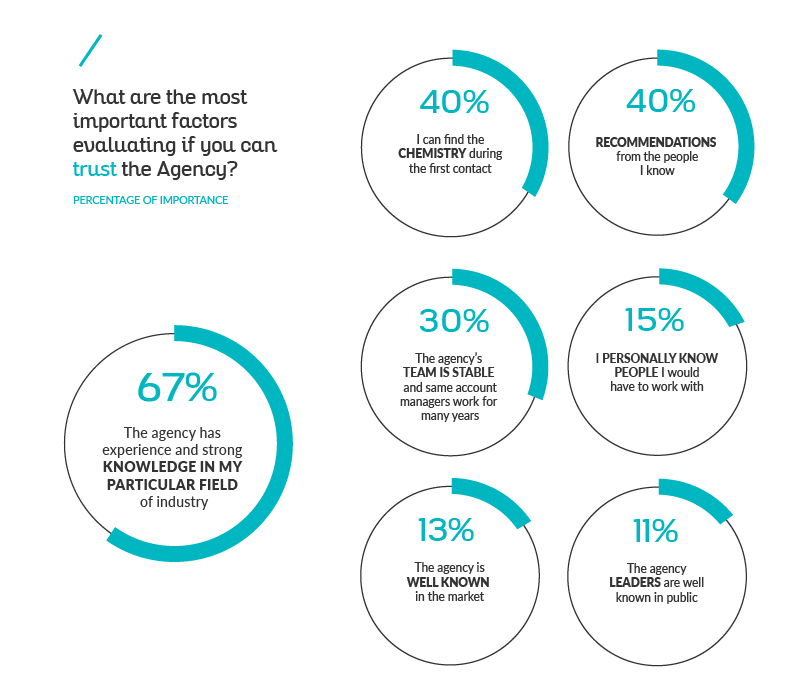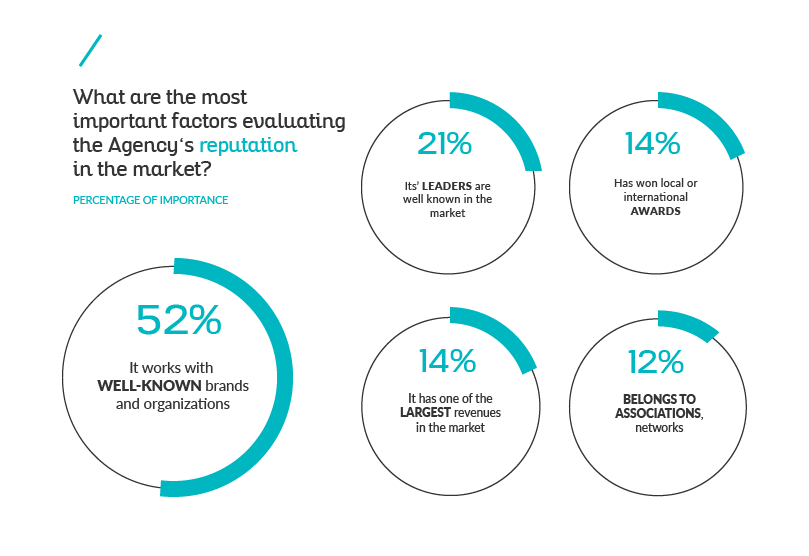Defining Criteria for the Best PR Firm
Today public relations is a profession that can fit a number of roles and functions, including media relations, corporate and marketing communications, brand awareness, creative solutions, and the list goes on. Depending on your business, the interaction with PR and the role of PR in your company can vary considerably.
Every business or industry share a similar understanding of what defines the best PR agency. Whether the business or industry is either trying to outsource their entire PR work or use a PR agency as support for in-house communication teams. Defining criteria is only one side of the story. Another task is asking the right questions and evaluating them.
The survey of 82 decision-makers leading marketing and communication departments of international companies was conducted in Lithuania in September 2019. People responsible for hiring PR agencies, shared their opinion on factors evaluating them on the scale from 1 to 5 that are the most important for them selecting the agency and working with one.

Look for Quality
Research reveals that the most important factor for the majority while choosing a public relations agency is the quality of services. This was identified as the major factor by 89 percent of respondents.
What defines quality?
About 81 percent of respondents trust the agency’s quality if they demonstrate:
• The ability to meet deadlines and keep promises
• Results measuring capabilities and responsibility for the results (two-thirds of the respondents evaluated it at the highest score)

Finding the right agency shouldn’t feel like spinning a roulette wheel and asking a few key questions upfront could help to identify an agency that can deliver the best quality. The key question to ask is simple:
What are the results of your recent projects?
Any struggle in answering this question directly should give a signal this agency won’t take responsibility or care enough about your results. While listening to the answers, try to understand if the agency’s representative only talks about immediate results they have achieved (number of publications, great media outreach).
Do they talk about the change they have contributed? Their impact could have caused a shift in opinion, increased sales, and more. You always want your agency to understand how their efforts contribute to your bottom line.
Look for Trust
The second most important aspect decision-makers look for in choosing a PR agency is trust that comes mostly from recommendations or a personal “gut feeling”. This important factor was indicated by 49 percent of respondents.
When it comes to trust in your future agency, it looks like it’s a combination of rational and irrational arguments. For example, 40 percent of respondents indicated that the “chemistry” within the first meeting with the agency plays a major role in the decision-making process. The same number of marketing and communication professionals tend to highly trust their friends and colleagues’ recommendations when selecting the agency.

Some companies dig into research before making a list of agencies to approach, and others ask for the contact details of the recent clients and make calls. If you’re about to make those calls or listen to recommendations, don’t forget to get to know what the scope of work and the level of responsibility was given to the agency.
Agencies tend to brag about the clients who are mostly known or have the highest marketing spending, but usually they are not the ones where the agency is given a real chance to make a change or real strategic responsibility. Before looking for a partner you can trust, you must:
• Define the role of the agency
• Look for the recommendations in a similar role and agency/client relationship setup
Don’t Count Blindly on the Portfolio
One of the most common mistakes clients do is give blind trust to the agency’s portfolio and experience in the field of industry. Almost 70 percent of decision-makers say they would trust an agency who has experience working in a certain field of industry.
Counting on to these criteria, don’t forget to check if people who have this experience are still within the agency and if those people will be the ones working with you. Pay attention to the fact that long-lifetime experience in a certain field has side effects as well. People specializing in a certain industry gain unbeatable media relations and deep industry knowledge, but they also become less creative. Therefore, it can be hard to expect anything out of the box from them.
Check Their Reputation
According to the research, the reputation of the agency in the market takes slightly less importance than personal trust but is also one of the major factors for most decision-makers.
It is noteworthy that reputation is mostly considered as working with well-known brands and organizations. The only question you must ask here is:
What are your current clients and brands that you represent?
Don’t get mistaken with the worldwide-known brands that the agency has worked with 10 years ago. Only now is what really matters.

The PR agency is a people business. You should care a lot about the stability, principles, and well-established management of the agency. And at the same time recognize how the agency is changing within the market, if there’s enough of young people working in it, and does it have an ability to understand how to talk to all of your target audiences today.
Check Their Capabilities
The communication discipline is changing, and your future agency should reflect those changes.
We asked the decision-makers what kind of services they currently expect from their PR agency. 64 percent of respondents said that strategic counseling and planning is the capability of major importance, followed by media relations (57 percent of people gave the highest importance ranking), crisis communication (54 percent), and social media and digital capabilities (37 percent).

Your right future PR agency will tailor their approach around multiple channels, mixing earned and paid media, digital and offline tools, to help you achieve broader marketing and organizational objectives.
Your right future PR consultant will align PR goals with the rest of the business goals. Your right future PR consultant from the right PR agency will ask questions about your business and will understand the answers and will proactively work to integrate with your team and provide strategy and deliverables that clearly match the company’s broader vision for success. Look for that.
Ask who will be your most senior consultant, and how many hours per month this person will work with you as a client. It’s not a secret that the first meeting with the client, agencies will go with people who are the best in sales, but often it’s the first and the last time they see the client.
Manage the Expectations
If the agency has experience in your industry, make sure there won’t be any current or potential conflicts of interest. It’s more common than you might think. And as you could imagine agencies don’t like to turn down work. So, it’s imperative that you make sure you are comfortable with their existing list of clients.
At the same time, talk about the budget. Before meeting the agency ask if they would be interested in your current spending. It would save a lot of time from the agency side and it would also help the client not to become “the least important” or “Level C” type of client in the agency’s portfolio. You always want to be important. Feel free to ask how many clients the agency has that operate within the same budget range.
Love Life Long
Selecting an agency is not an easy task. Because you’re selecting a partner who will be and should be trusted not only with your most sensitive data, but also your goals, aspirations and biggest fears. A carefully selected and trusted PR agency should become your biggest cheerleader, protector, and a loving friend.
This is the reason most of the companies tend to work with their PR agencies for years. That’s why even 95 percent of respondents have indicated that they are intended to work with the same public relations agency for as long as possible, instead of making a new tender every year (5 percent).
About the survey:
The survey has been conducted by a strategic communication agency ADVERUM from Vilnius, Lithuania. 82 marketing and communications directors representing the largest local and international companies were interviewed in a period of August 29- September 10, 2019.
- Posted on: November 14, 2019
- Tags: Adverum, communications, Ieva Naujalytė, PR, public relations agency
